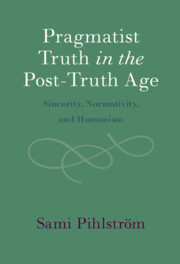Book contents
- Pragmatist Truth in the Post-Truth Age
- Pragmatist Truth in the Post-Truth Age
- Copyright page
- Epigraph
- Contents
- Acknowledgments
- Introduction
- Chapter 1 James’s Children?
- Chapter 2 Religious Truth and Pluralism from a Pragmatist Point of View
- Chapter 3 Around or through Kant?
- Chapter 4 The Will to Believe and Holistic Pragmatism
- Chapter 5 How Is Normativity Possible?
- Chapter 6 Pragmatic Agnosticism – Meaning, Truth, and Suffering
- Conclusion
- References
- Index
Chapter 1 - James’s Children?
The Pragmatist Conception of Truth and the Slippery Slope to “Post-Truth”
Published online by Cambridge University Press: 14 September 2021
- Pragmatist Truth in the Post-Truth Age
- Pragmatist Truth in the Post-Truth Age
- Copyright page
- Epigraph
- Contents
- Acknowledgments
- Introduction
- Chapter 1 James’s Children?
- Chapter 2 Religious Truth and Pluralism from a Pragmatist Point of View
- Chapter 3 Around or through Kant?
- Chapter 4 The Will to Believe and Holistic Pragmatism
- Chapter 5 How Is Normativity Possible?
- Chapter 6 Pragmatic Agnosticism – Meaning, Truth, and Suffering
- Conclusion
- References
- Index
Summary
The first chapter asks whether there is a threatening slippery slope from William James's pragmatist conception of truth (as presented in his 1907 work, Pragmatism), via Richard Rorty's radical neopragmatism, to Donald Trump's and other populists' fragmentation of the concept of truth, or even ultimately to the destruction of truth depicted in George Orwell's dystopic novel, Nineteen Eighty-Four (1949), whose character O'Brien was interestingly analyzed by Rorty in a 1989 essay on Orwell, arguing for the primacy of freedom over truth. The chapter criticizes Rortyan pragmatism by arguing that the concept of freedom also presupposes the concept of truth (and not just the other way round), also suggesting that, despite the unclarity of some of James's original ideas about truth, there is a sound core to the Jamesian conception of the pursuit of truth. It is, furthermore, suggested that the concept of truth may itself receive a plurality of interpretations within a (meta-level) pragmatist understanding of truth, one of them being the realistic correspondence account, which remains highly relevant, e.g., in the context of combatting post-truth politics.
- Type
- Chapter
- Information
- Pragmatist Truth in the Post-Truth AgeSincerity, Normativity, and Humanism, pp. 12 - 39Publisher: Cambridge University PressPrint publication year: 2021



